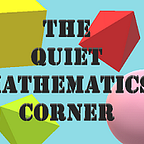Solution Insights: Problem on Number Theory for 07-02-2022
The solution to this problem requires the knowledge of an essential fact or observation that the cube of any integer is congruent to 0, 1 or 6 mod 7.
Now, let us consider the following two cases.
Case l: When any of a, b and c are congruent to 0 mod 7
This clearly implies that the given expression is divisible by 7.
Case 2: When none of a, b and c are congruent to 0 mod 7, i.e., a³, b³ and c³ are each congruent to either 1 or 6 mod 7.
As there are three numbers a³, b³ and c³, and only two remainders, 1 and 6; by PHP, we can conclude that at least two of a³, b³ and c³ leave the same remainder when divided by 7. The expression abc(a³ - b³)(b³ - c³)(c³ - a³) contains the differences of the pairs of numbers a³, b³ and c³. Clearly, at least one of (a³ - b³), (b³ - c³) and (c³ - a³) must be congruent to 0 mod 7 (this follows from the conclusion in bold).
Thus, in this case as well, the given expression is divisible by 7.
As Case 1 and Case 2 are mutually exclusive and exhaustive, it can be concluded that 7 | [abc(a³ - b³)(b³ - c³)(c³ - a³)].
QED.
PHP stands for the Pigeon Hole Principle.
